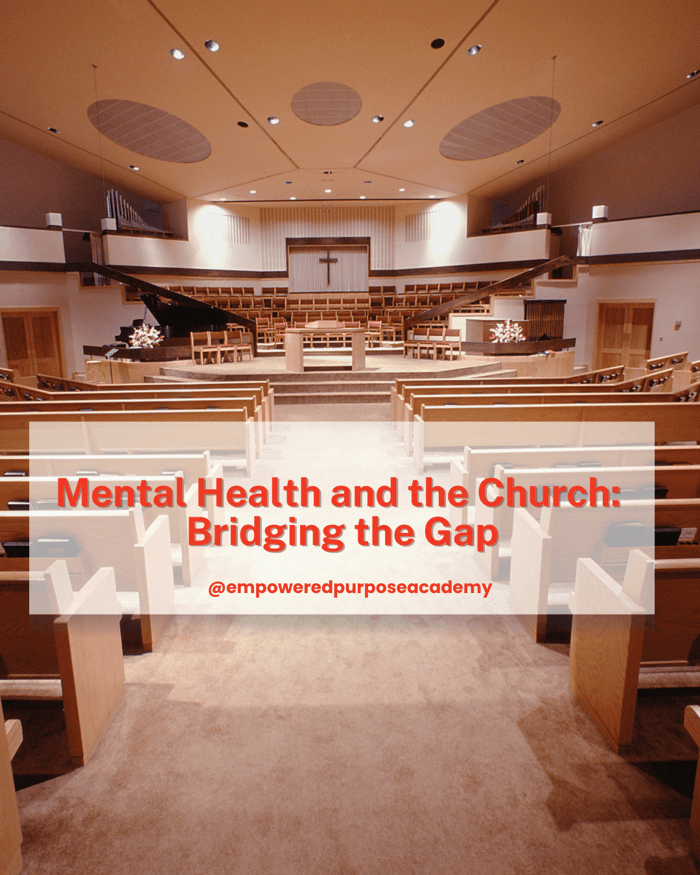Table of Contents
- Mental Health and the Church: Bridging the Gap
- The Church’s View of Mental Health: By the Numbers
- Mental Health and the Church: Addressing the Stigma
- Mental Health and the Church: The Role of Christian Leaders in Mental Health
- The Role of Mental Health Professionals in the Church
- How Christian Leaders and Mental Health Professionals Can Improve the Future
- Mental Health and the Church: Conclusion
- FAQs
Mental Health and the Church: Bridging the Gap
Mental Health and the Church: Bridging the Gap
 Mental Health and the Church: Bridging the Gap
Mental Health and the Church: Bridging the GapThe Church’s View of Mental Health: By the Numbers
A 2020 study conducted by Lifeway Research revealed that 49% of pastors rarely or never speak on the topic of mental illness in sermons. Additionally, 35% of pastors acknowledge that they are reluctant to admit their own struggles with mental health out of fear of losing their congregation’s confidence. In the same study, 23% of pastors reported that they had personally struggled with some form of mental illness. Yet, the fear of stigma often prevented them from openly discussing their battles.
The stigma around mental health in the church isn't exclusive to pastors. Pew Research (2021) found that 46% of Christians believe that prayer and Bible study alone can solve mental health issues, while only 27% of the general population holds this belief. This view often discourages church members from seeking professional help for mental health challenges, leading many to suffer in silence.
Another alarming statistic from Barna Group (2022) revealed that 60% of Christian adults believe that churches are more likely to provide support for physical illnesses than mental health conditions. Despite mental health disorders affecting one in five adults in the U.S., according to the National Institute of Mental Health (NIMH, 2021), churches have been slower to address the issue compared to secular institutions.
These statistics illustrate a clear divide between mental health support and spiritual leadership, but it doesn’t have to remain this way. Christian leaders and mental health professionals have the opportunity and responsibility to close this gap.
Mental Health and the Church: Addressing the Stigma
The root cause of the church's hesitation to embrace mental health support is often rooted in stigma. In many Christian communities, mental health disorders are seen as a spiritual weakness, with individuals being advised to "pray harder" or "have more faith" instead of seeking professional help.
To combat this, pastors and church leaders need to first recognize that mental health challenges do not reflect a lack of faith. Just as God has equipped doctors and nurses to care for our physical bodies, He has also equipped mental health professionals to care for our minds. Mental illness is not a reflection of weak spirituality; it is a health condition that deserves attention, compassion, and treatment.
Moreover, church leaders can take the following steps to address stigma:
- Start the conversation: Pastors and leaders should openly discuss mental health from the pulpit. Sermons that address the struggles of anxiety, depression, and other mental health conditions can encourage individuals to seek help without feeling ashamed.
- Use Scripture Wisely: While prayer and faith are crucial components of the Christian life, it is essential to avoid implying that mental health challenges result from insufficient faith. Emphasize verses that speak to the holistic healing of body, mind, and spirit, such as 1 Thessalonians 5:23, which calls for believers to be sanctified wholly—spirit, soul, and body.
- Provide education: Educating church members about mental health is key to breaking the cycle of stigma. Hosting workshops, Bible studies, or inviting mental health professionals to speak can inform the congregation that seeking professional help is okay. Be sure to check out the Faith and Mental Wellness Podcast.
Mental Health and the Church: The Role of Christian Leaders in Mental Health
The role of Christian leaders in addressing mental health cannot be understated. Churches are often seen as safe havens for individuals experiencing hardship, and leaders are uniquely positioned to provide support. Here are several ways church leaders can make a difference:
- Normalize mental health discussions: Pastors and church staff should be willing to talk about their own experiences with mental health. Vulnerability from leadership can dismantle the shame associated with these struggles.
- Foster partnerships with mental health professionals: Churches can partner with local Christian mental health professionals to provide resources and services to their congregation. This might include offering counseling services, support groups, or referrals to trusted therapists.
- Offer training for staff and volunteers: Equipping ministry staff with mental health training, such as Mental Health First Aid (MHFA), can help them recognize signs of mental health struggles in members and provide appropriate support or referrals.
- Create a safe environment: Ensure the church is where members feel safe sharing their mental health struggles without fear of judgment. Support groups, counseling ministries, and dedicated prayer times for mental health can foster an atmosphere of support.
The Role of Mental Health Professionals in the Church
Here are some ways to improve we can improve Mental Health and the Church:
- Educate congregations: Christian therapists and counselors can offer seminars and workshops in churches to educate members about mental health and the importance of seeking professional help. You can bring qualified experts to train and educate your congregation about Mental Health and the Church. Consider Shakeeta Torres as an expert on Mental Health and Faith.
- Integrate faith-based principles: Christian mental health professionals can integrate biblical principles into therapy sessions, helping clients understand that God cares about their mental well-being as much as their spiritual growth.
- Collaborate with pastors: Mental health professionals can work closely with pastors to provide holistic care. For instance, if a pastor notices that a member is struggling with depression, they can refer that individual to a trusted therapist while continuing to provide spiritual support through prayer and pastoral counseling.
- Promote mental health resources: Mental health professionals can help churches build resource libraries that include faith-based mental health books, podcasts, and other tools that encourage emotional healing and spiritual growth. For great content, check out The Faith and Mental Wellness Podcast. Another excellent resource for growing your library is EmPowered Purpose Academy.
How Christian Leaders and Mental Health Professionals Can Improve the Future
While there has been progress in recent years, more work is needed to ensure that the church becomes a welcoming and supportive place for those struggling with mental health issues. To achieve this, Christian leaders and mental health professionals must continue working together to break down the barriers of stigma and misinformation.
Some practical steps to move forward that will improve we can create churches that reflect Christ's heart for the hurting, ultimately helping individuals to include:
- Providing more mental health training for pastors and church staff: Many pastors feel ill-equipped to handle mental health crises. By offering more training, churches can better equip themselves to provide support.
- Increasing awareness about mental health in seminaries: Future pastors and ministry leaders should receive training on mental health during their theological education. This will prepare them to provide comprehensive care for their congregations.
- Building a referral network: Churches should establish referral networks with Christian mental health professionals so that when individuals need professional help, they can access trusted resources that align with their faith.
- Hosting community mental health events: Churches can play a pivotal role in promoting mental wellness by hosting health fairs, offering free counseling sessions, and inviting guest speakers to address mental health topics.
Mental Health and the Church: Conclusion
As we continue to see the rise of mental health challenges in our society, the church has an opportunity to be a place of healing for the whole person—mind, body, and spirit. By embracing the role of mental health in the Christian walk, we can create spaces where believers are encouraged to seek the help they need without feeling shame or guilt. Christian leaders and mental health professionals can work hand in hand to break the stigma and build a future where faith and mental health are intertwined in a way that promotes proper healing.
By normalizing mental health conversations, providing resources, and offering compassionate support, we can create churches that reflect Christ's heart for the hurting. This will help individuals live out their God-given purposes in fullness and wholeness.
FAQs
1. Why has the church historically struggled to address mental health issues?
The church has often struggled to address mental health due to lingering stigma and misconceptions. Many Christian communities view mental health struggles as spiritual weakness, emphasizing prayer and faith over seeking professional help. This stigma discourages open conversations and leaves many suffering in silence. Churches must embrace mental health as part of holistic care that nurtures both the soul and the mind.
2. How can pastors and church leaders address mental health stigma?
Pastors and church leaders can combat mental health stigma by:
- Talking openly: Preach sermons that address mental health topics like anxiety, depression, and trauma.
- Using Scripture thoughtfully: Highlight verses that emphasize holistic healing, such as 1 Thessalonians 5:23.
- Educating congregations: Host workshops and invite mental health professionals to speak on mental health topics.
- Being vulnerable: Share personal experiences with mental health challenges to normalize the conversation.
3. How can mental health professionals partner with churches?
Mental health professionals can collaborate with churches in several ways:
- Educating congregations: Lead seminars or workshops to increase awareness about mental health.
- Providing resources: Help churches build libraries of faith-based mental health materials.
- Integrating faith into therapy: Use biblical principles in counseling to align mental health care with clients' spiritual beliefs.
- Supporting pastors: Offer training or consultations to help pastors recognize and respond to mental health needs within their congregations.
4. What steps can churches take to support individuals struggling with mental health issues?
Churches can provide meaningful support by:
- Creating safe spaces: Offer support groups or counseling ministries where members feel comfortable sharing their struggles.
- Building referral networks: Partner with Christian therapists to provide professional mental health resources.
- Providing training: Equip staff and volunteers with mental health skills, such as Mental Health First Aid (MHFA).
- Hosting mental health events: Organize health fairs or free counseling sessions to raise awareness and provide practical help.
5. Why is addressing mental health important for the church’s mission?
Mental health is essential to holistic well-being, and addressing it allows the church to reflect Christ’s compassion for the hurting. By supporting individuals struggling with mental health, the church can:
- Break stigma and foster inclusion.
- Help believers live out their God-given purposes in wholeness.
- Strengthen families, relationships, and communities.
- Demonstrate God’s love through practical care for the mind, body, and spirit.








